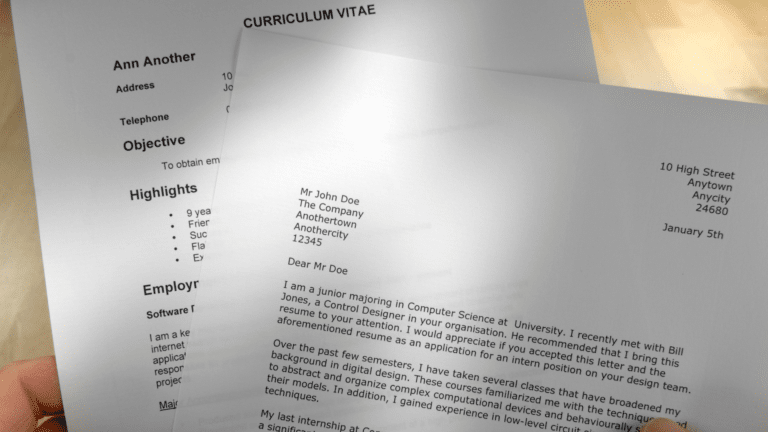We’ve all gotten stuck at least once during interviews.
And in most cases, it’s the same type of questions that bring trouble.
We’re talking about behavioral questions.
They usually start with phrases like “tell me about a time when you…” or “give me an example of a situation when…”
….and are followed by your mind going BLANK.
Nervousness creeps in and you quickly search your memory for that compelling story that will back your achievements and make you stand out.
Nothing. You suddenly forget everything that you’ve ever done and after a good 5-minute wait, you decide to go with some story that is only halfway convincing.
Well, we’re here to tell you that there’s a way to avoid all that: the STAR method.
And we’re going to teach you all about it in this guide.
Here’s what we’ll cover:
- What is the STAR Method and How You Can Use It
- 5 Key Tips to Remember
- 5 Interview Questions That Use the STAR Method [+ Example Answers]
What is the STAR Method and How Can You Use It
The STAR method is a technique that will help you answer the behavioral questions in a job interview. These questions are what interviewers use to get a hint at how you have handled previous work situations and how you might react in the future.
Your answer demonstrates a skill that you possess and how you have previously used it. You might have mentioned that skill on your resume or when they asked about your greatest strength.
Such questions are easy to spot. They always require you to tell a story or give an example and sound similar:
- “Tell me about a time when…”
- “Have you ever had a situation where…What did you do?”
- “Can you give me an example of…”
- “Describe a time when…”
The STAR method helps you answer all of them.
The acronym represents a structure that you can follow so that your answer is complete and to the point.
Here’s what it stands for:
Situation – Provide the context. Trouble with a coworker? Tight deadline on a school project? Set the scene for the interviewer so they better understand the example.
Task – Explain what your role and responsibilities were in the situation. Did you have to monitor a group of people? Reach a certain target?
Action – Describe what you did to complete the task or overcome the challenge. Be specific about YOUR role in it, and not what your team, boss or company did.
Result – Share the result your actions led to. You can also mention what you learned from this experience.
Let’s clarify this with an example.
“Have you ever had a situation where one of your coworkers was not cooperating? What did you do?”
The applicant is applying for a position that requires a lot of communication and collaboration with coworkers and the interviewer wants to see how they would fit in that environment.
Here’s the answer:
“Yes, I’ve been in that situation. A new member joined our team of real estate agents. He wasn’t participating in meetings a lot and it appeared he was very disinterested. This went on for a while and some other agents started complaining about it. As the team’s coordinator, I had to make sure work was running smoothly and most importantly that everybody was on good terms and had no struggles. I approached the new agent and asked him if there was anything that made him uncomfortable with the team or he was struggling with. He explained that he wasn’t feeling fully confident about taking any responsibilities yet and wanted to understand the dynamics of the team and job better.The only way to do that is to actually get your hands on the job, so that’s what I suggested. I gave him one of the properties I was supposed to sell so he could have his first listing. I assisted him through the process and he actually did a good job. There weren’t any more problems after that. The year after that he even reached a record and sold a $2m property. I learned that sometimes a little motivation can really be helpful.”
Let’s break down the answer:
S – A new member that joined the real estate team was being very inactive. This brought complaints from other agents.
T – As a coordinator, the interviewee had to make sure there was collaboration between members, so solving this issue was their responsibility.
A – They tactfully approached the new agent to find out the problem and offered him a listing to help him transition into the job.
R – The agent successfully sold the property and the situation was overcome.
Getting the STAR Method Right
Just remembering the acronym and its meaning already helps you a great deal.
To make sure you give a 5-STAR answer however (pun intended), there are some tips you need to keep in mind.
#1 – Prepare Several Examples
If you stay ready, you don’t need to get ready. Avoid a blank state of mind by preparing some examples beforehand. Here’s how to do that:
- You can look at the job posting and find the skills the company is looking for.
- Then, think about specific situations where you have used and displayed each of these skills.
- Prepare how you will back them up in behavioral questions by using the STAR method.
[Pro Tip
Having some answers prepared usually avoids surprises. However, if you are caught off guard and don’t have an example ready, it’s better to ask for some time rather than quickly saying whatever comes first to mind. Don’t be afraid to ask for a minute to think.]
#2 – Be Relevant
Make sure all the examples you prepare for the interview are related to the position you are applying for.
No matter how well-structured your answer is, there is no point if the story you are explaining is irrelevant.
That time your essay made it to the school’s newspaper? Not the best story to mention when interviewing for a financial analyst internship.
#3 – Only Necessary Information
While explaining situations, it’s easy to get carried away and get into details. That would cause your answer to be exceedingly long and your achievements will get lost in the sea of irrelevant information.
Instead, try to be concise and only focus on the necessary information of the story.
#4 – Be Honest
We know you want the job and want to make the best impression you can, but lying is out of the question. The last thing you want to do is inflate your story or even worse, say something that is completely untrue.
Worst case scenario, you’ll be asked a followup question that will expose your lie or you get the job and are faced with having to demonstrate the skills that you lied about.
Best case scenario, ….. well there really is no best case scenario. Stick to the truth.
5 Interview Questions That Use the STAR Method [+ Example Answers]
You never know exactly which behavioral questions the interviewer will ask, but the bottom line is the same in all cases – give an example of a specific situation where you demonstrated a certain skill.
We’re going to give you 5 examples and show you how to answer using the STAR method.
How to Answer “What is your greatest achievement?”
The interviewer gets a lot of information by asking this question. They’re trying to see what you perceive as success, how you talk about it, and most importantly if you ever went above and beyond in your job. Let’s assume that you read on the job posting that they were looking for someone with crisis-management or problem-solving skills. This is how you could answer:
“Well, my greatest professional achievement would have to be the time I took over the role of event coordinator while working at company X. We were down to the last two hours of organizing the anniversary party for a huge brand when we got a call that the food catering van had had an accident. The coordinator was already panicking before that, but when the call came… she just quit. That was completely unexpected. At the time I was her assistant, but I decided to step up and try to manage the situation. Through some connections, I got another catering company to bring us food and made sure we got a refund from the previous one. Everything was ready on time and the event went smoothly. I got the permanent position as event coordinator after that night.”
How to Answer “Tell me about a time when you handled a challenging situation”
The interviewer is trying to understand what you consider challenging and what approach you take to overcome difficult situations. Again, you can give an example that illustrates a skill mentioned in the job posting.
“While I was working as a sales agent at a boutique, we had an unfortunate malfunction. Our payment system stopped working all of a sudden. We were in the middle of quite a busy hour and the maintenance said it would take about 20 minutes to solve the issue. For that amount of time, I decided to have all sales go through and write them in a notebook. Luckily, the credit card machine was still working so everybody had receipts. The people that paid cash, I gave a $0 receipt to have in case they needed returns or exchanges. I made sure to put a complimentary soap bar with all of their purchases. Luckily the system was up and running very quickly and no clients complained. I later entered all sales in the system and let the manager know what had happened. She was very pleased with my quick thinking and gave me a raise.”
How to Answer “Tell me about a time when you handled conflict well.”
It’s very important for employers that there is no conflict between co-workers. Employees should be able to solve their issues by themselves without making a big deal or interfering with work. That’s what this question is about.
“When I first joined Company Y, I had to work a lot to earn my colleagues’ trust and respect. They had been with the company since the day it was founded, so they were like a family. As a new addition to the team, they weren’t very enthusiastic to have me. Almost everybody warmed up to me, except for one of the secretaries that kept notifying me late for meetings and misplacing my files. After a while, it became a problem as it was affecting my punctuality and image with my boss, so I decided to invite her to eat lunch together and talk. Luckily she agreed. I explained to her that I understood where she was coming from and I had no intention of disrupting the work dynamic they had already established. She apologized for her behavior and told me that was behind us. True to her words, we had no problems afterward. We never became best friends, but we established a very good professional relationship.”
[Pro Tip
When answering behavioral questions, avoid bad-mouthing your previous co-workers and employer. You appear sour and give the impression that if anything were to happen on this job, you will badmouth this company as well. You can’t go wrong with a positive attitude.]
How to Answer “Give me an example of a time when you made a mistake.”
Everybody makes mistakes, your employer included, so they’re not trying to see if you are perfect or not. Rather, they want to know how you own up to your mistakes and what you do to solve them.
“I was scheduled to meet with a client to pitch them my marketing strategy for their upcoming product release. I was a little nervous since it was a big client so I made sure to get to the office before them and set up the presentation in advance. That’s when I realized I had taken the wrong USB with me. I was mortified. I immediately called a colleague and asked if they could bring me the right one. Both me and the client, who had arrived at the time, had to wait. I explained my mistake and luckily they were very understanding. There was a good side to that wait, though. We talked about the history of their company and I learned a lot more about their company culture and customer base. I used that as an opportunity to explain how my strategy fit with both those factors and I succeeded.They loved the pitch and went with it.”
How to Answer “Tell me about a time when you handled pressure well.”
You can tell what the interviewer is trying to find out here, right? The best teller to how you might handle or react to pressure in the future is… well, how you handled or reacted in the past.
“My whole senior year was definitely charged with pressure, but there was this one specific week where I had to balance a lot of responsibilities. I was an active member of 3 clubs, all of them getting ready for their main events the following week. I also had final exams in a matter of days. Maintaining my GPA was one of my biggest priorities, but I had also agreed to contribute to the event organizations, so I had to manage my time to the minute. I would attend my classes and in between them, I would visit the venues and make the necessary calls for the events. In the evening, I would go to the library and focus on my studying until late. It was a hectic week, pressure from all sides, but it was well worth it. The events were a success and I did great in my finals. I even made it to the Dean’s List that same semester.”
Key Takeaways
Behavioral questions are always intimidating, but the STAR method helps you avoid that brain freeze and instead give an impressive answer.
Remember to:
- Pick a relevant example. There’s no point in following the structure otherwise.
- Prepare a few answer options in advance. That way you leave less to chance.
- Only mention what’s necessary. You don’t want to get the interviewer lost in too many details.
As long as you remember the acronym and these tips, and practice a lot, you will ace behavioral questions.









